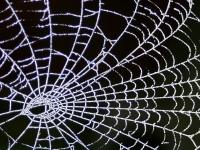BOB GARFIELD: If any major publication is synonymous with digital technology, it has to be Wired. For 17 years it has chronicled the intersection of technology with commerce, culture, and even politics. It’s a slick Condé Nast monthly, but it has far greater reach on the Web, which is fitting because it is so much about the Web. Therefore, when its September cover screamed “The Web is Dead,” eyebrows were raised everywhere in the world electrons are sold. Chris Anderson is Editor-in-Chief of Wired and co-author of the lead essay. Chris, welcome back to OTM.
CHRIS ANDERSON: Thanks, great to be here.
BOB GARFIELD: Let's start very basic. People tend to use the words “Web” and “Internet” interchangeably but they aren't synonyms. But please explain.
CHRIS ANDERSON: The Internet dates back to the '70s, and it is the network, the wires, the routers and all that on which digital information flows. These days a lot of the information that we receive over the Internet is via our Web browser, and that’s in, you know, HTML on websites. But increasingly, especially as we're shifting to mobile computing with iPhones and iPads and, and living room computing with Xboxes and Netflix streaming, we're increasingly consuming information that’s transmitted over the Internet, but not viewed via the Web.
BOB GARFIELD: What you say here seems to bode very poorly for Web 2.0, the vaunted democratization of communications, the world in which we're all content creators sharing among ourselves. If Steve Jobs and Mark Zuckerberg win, do we all lose?
CHRIS ANDERSON: There is the commercial content Web, and I do think that that’s being driven towards the more closed platforms. But there’s a lot more to the Web than that. There is the community, a lot of the non-monetary amateur activities. And that continues to be what the Web is best at. And so, I think what we're seeing here is not so much an end of the idealized form of peer-to-peer, bottom-up creation that the Web does so well, but more the end of the notion that one Web model would be the only model and that all content and commerce was going to have to take place via the browser because it was the one universal platform. What you’re seeing instead is that the non-commercial stuff continues to happen in the browser but that a lot of the commercial content is moving towards other platforms where there’s more control and, therefore, more opportunity to make money.
BOB GARFIELD: How does this all bode for Google, which is the undisputed king of the Web world?
CHRIS ANDERSON: Google’s built around the notion of the open Web, which is to say that if they can search everything and put ads against all search results and increasingly against independent content, that they in a sense can be the one-stop shopping for information and advertising. As more of the Web becomes invisible to Google, behind the paywalls, in Facebook, in apps, that notion that going to Google is the same as finding everything starts to erode, and therein lies problems for their advertising model, as well. Google’s drive to Android and mobile platforms is an effort to avoid that fate. But as goes the Web, so goes Google. And there are, you know, some concerns that the Web’s fragmentation does, in fact, cut at Google’s business model.
BOB GARFIELD: The University of Virginia academic Siva Vaidhyanathan speculated that fear of the open Web being eclipsed is what motivated Google to cut a deal with Verizon on net neutrality. Do you think that makes any sense?
CHRIS ANDERSON: Google’s mobile strategy and the fact that “don't be evil,” which is such a kind of imperative in the Web space, needs to be interpreted differently as you move into different markets like mobile is a reflection that, you know, maybe the Web’s canonical philosophy of everything on one platform, everything open doesn't actually scale to the living room, doesn't scale to your pocket and that, in fact, business logic requires that they apply different standards.
BOB GARFIELD: We tweeted your story link. We tweeted something like, Wired says the Web is dead, and [LAUGHS] got a hilarious re-Tweet that said, the Web expresses surprise that Wired is still alive. [LAUGHS] If the world of apps does eclipse the open Web, is this good news or bad news for traditional media companies, like your very own Condé Nast?
CHRIS ANDERSON: Much of the traditional media industry is betting heavily on apps, not just because it’s a closed market and we can charge for it, but also because we can control the experience better for the sake of the consumer. Pulling together, curating an immersive experience didn't work that well on the Web because fundamentally it’s about photos or thumbnails, banners and all sorts of clutter. It’s hard to come up with a compelling editorial experience. Apps offer that. And the barriers to entry for apps are higher, so we're not looking at infinite competition the way we are on, on the Web.
BOB GARFIELD: So is there some element of wishful thinking here?
CHRIS ANDERSON: There is certainly an element of wishful thinking, but there’s also an element of evidence. You know, the iPad is now a success. This does, in fact, look like the third great computing platform – the computer, the phone and now the iPad. And so, you know, do we want it to succeed? Absolutely. Does it look like it is going to succeed? Yes, it does.
BOB GARFIELD: [LAUGHS] All right, Chris. Thank you so much.
CHRIS ANDERSON: Thank you.
BOB GARFIELD: Chris Anderson is Editor-in-Chief of Wired Magazine, and author of September’s title essay, The Web is Dead.
[MUSIC UP AND UNDER]

